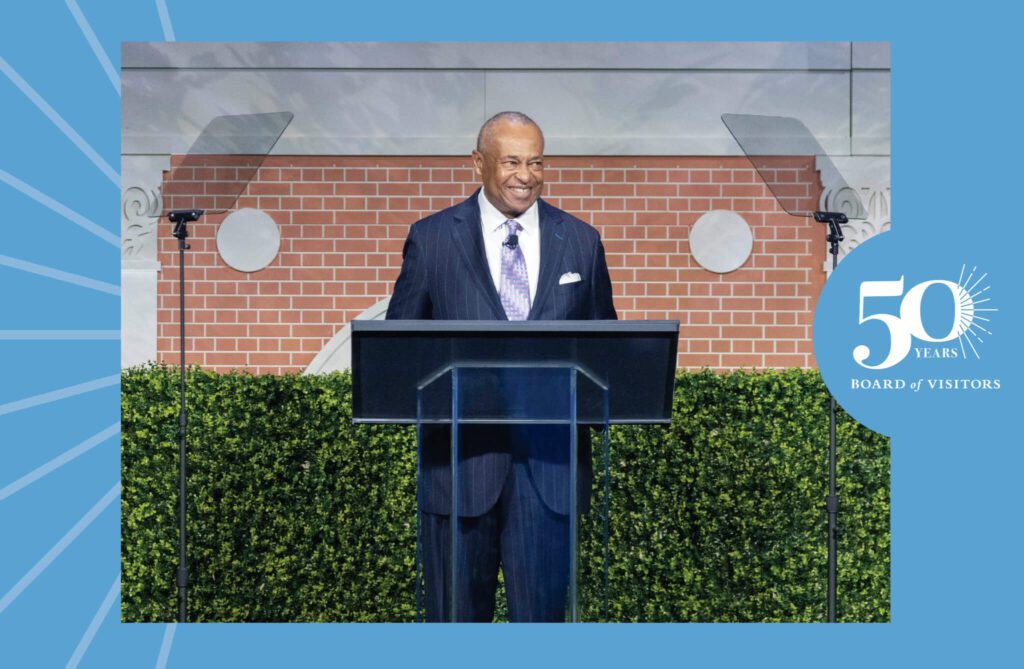
To celebrate the UNC Board of Visitors’ 50th anniversary, we are sharing what it’s like to volunteer from the perspectives of past and present members.
This month, we chatted with Michael Kennedy ’79, who served on the Board of Visitors (BOV) from 2008 to 2012, and was chair from 2010 to 2012. Kennedy served two one-year terms, which had never been done before. He joined just after finishing the Bicentennial Campaign for Carolina, where he stepped forward as a regional volunteer, later joining the National Steering Committee for the Carolina First Campaign. Leading the Minority Alumni Committee, he gathered insights from diverse alumni, guiding UNC towards increased engagement and diversity. Michael’s strategic planning and fundraising efforts led to expanded diversity representation on boards, the establishment of the American Indian Center and as a founding member of the Alumni Committee on Racial and Ethnic Diversity (ACRED). He is also a member of the UNC-CH Foundation Board, Chapel Hill Investment Fund Board and Educational Foundation Executive Board of Directors. Kennedy and his brothers, who are fellow Carolina alumni, founded the Willie Hall Kennedy Scholarship in the School of Education, which pays tribute to their grandmother, and supports a student dedicated to teaching in North Carolina’s public schools.
BOV volunteers assist the Board of Trustees and the chancellor in a range of activities that advance the University. Kennedy shares his experience as a BOV member in this Q&A.
Why did you volunteer for the Board of Visitors?
I was excited to join the Board of Visitors because I thought it would provide an opportunity to really learn more about the University, the various schools and units, and to interact with the senior team at the University gaining a broader view of Carolina. Additionally, I saw it as an opportunity to give back to the University alongside other accomplished individuals, with the hope of making a meaningful impact and moving Carolina forward.
What has been the most rewarding part of your experience as a BOV member?
My most rewarding experience was leading efforts to engage Board of Visitors members. Initially, there was uncertainty about the board’s purpose beyond occasional campus visits. As vice chair, I initiated the Student Recruitment Committee, which continues today. Progressing to chair, we expanded initiatives further. Serving a rare second term as chair, I consider our success in fostering engagement, particularly through the student recruitment committee, a significant achievement.
What accomplishments are you most proud of?
During the Carolina First Capital campaign, leadership asked me to build a strategy around the Minority Alumni Committee. It was so successful not only in fundraising and increasing participation, but also bringing forward other ideas to the chancellor about communities of color that had been neglected. Alumni of color and the University were able to address some of those and after the campaign was over, Chancellor [Holden] Thorp came to me and asked whether or not we could keep the Minority Alumni Committee together. It was playing a pretty significant role, and that’s when it was renamed ACRED, which still exists today. That’s something I’m proud about.
As for the Board of Visitors, despite Carolina’s strong admissions, we were losing students to other schools. To address this, we formed the Student Recruitment Committee to boost our yield. Our efforts were successful, providing potential students with more personalized attention and care, showing them Carolina’s genuine interest in having them at UNC.
As the BOV celebrates 50 years, what is one thing you want everyone to know?
The Board of Visitors is a great committee charged with educating the community about the inner workings of the university that helps foster more effective leadership for other committees and boards around campus. Many of Carolina’s leaders over the past 50 years have emerged from this committee, benefiting from its knowledge and networking opportunities. This interconnectedness ultimately strengthens leadership throughout the University.

